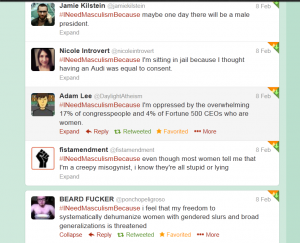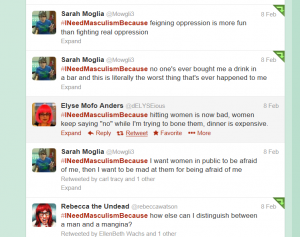Udo Schuklenk alerted me to a post by a philosopher at the University of Gothenburg on online hate harassment.
In my country, there have been repeated public debates about the completely unacceptable and many times obviously criminal behaviour of some people when they use the anonymity of online resources to react to other people’s open and publicly expressed opinions. In particular against women, especially those who express some sort of view on gender, family or sexuality related policy issues.
Yours too, huh? How about that. It’s the same here.
Recently, these debates have received a renewed momentum, as a large group of Swedish female public figures, journalists, debaters, bloggers, etc. – but also ordinary women engaging themselves in public discussions online – have gone public with what sort of awful filth they are exposed to from a presumably minor but apparently very active group of people. Even our prime minister has publicly identified the problem as serious and said that steps need to be taken.
That’s not so much the same here. I’ve never heard of Obama saying anything about online hate harassment of women.
Most of his links are to Swedish sites, naturally, but he also includes a few in English. Like ‘I dream that my son has been butchered’ by journalist Åsa Linderborg.
”Can’t that disgusting whore Linderborg just lie down and die?”
“She is such a whore, that bitch seems to be completely deranged. Lock the hooker in an mental asylum and throw away the key.”
“Swedes hate you, you feminist communist asshole.”
Then came the threats.
“It wouldn’t surprise me if this whore ends up with a price on her head soon.”
“Åsa Linderborg should be taken out of action. Permanently.”
”It’s happened before that a propagandizing cockroach or a pig who’s hostile to Swedes has been recognized on the street or in a department store”.
(Editor’s note: Swedish Prime Minister Olof Palme was gunned down and killed in the street in 1986. Foreign Minister Anna Lindh was stabbed in a Stockholm department store in 2003 and died from her wounds.)
Ulrika pointed out both places to me when we were walking to places in central Stockholm.
Yet another person writes that it’s not difficult to find me, before posting my address: ”This is where she lives.”
It is November 30th, 2012. The culture pages of the tabloid Aftonbladet, which I edit, have just begun publishing a series of investigative reports into far-right websites in Sweden.
The threats start coming.
My bosses tell me to go home and pack my bags. I tell my son we can’t live at home for a while. We take one bag each and head off. I leave my son with his father, I continue to a friend’s house.
That night, I dream that my son has been butchered. He is sitting in an armchair and I’m picking up his severed limbs and putting them back together, hoping they will melt back into place.
It is not the dream that wakes me, it’s an SMS from an untraceable pay-as-you-go mobile phone: ”Seriously sweetheart, when was the last time you got yourself off?”
I go check out the sites we at Aftonbladet have been investigating. There are hundreds upon hundreds of comments: “I hope a Congo negro rapes and murders you, you little cunt. You’re worth less than a silverfish on the bathroom floor.”
Free speech.
That night I receive another SMS: ”I hope you’ve shaved down there because I really want to come over and fuck you hard in your fat ass and wrinkly cunt.”
There are days when I cannot bring myself to talk about the threat, because I feel a bit silly and I don’t want to make myself out to be a martyr.
Then there are days when I need to rant and dissect my anxiety over the fact that I’m still separated from my child, who has stayed on with his father. My anxiety over people wanting to hurt us. Over people maybe hurting us.
To calm me down, and maybe to quell their own fears, my friends say there is no need to be scared of those kinds of people, because they’re not very smart.
Because it takes brains to get violent? Please. I suppose that’s a variant of the just world fallacy, and perhaps also the kind of thinking that Hannah Arendt was addressing with Eichmann in Jerusalem – the idea that only significant people can do significant harm.
“In Russia we also had a journalist like this,” one of them writes. “Her name was Politkovskaya. Now she is dead. Killed by patriots.”
I am yet again awoken by an SMS: ”I assume it’s been a while since you got a bit of cock as you’re so old, but let me know if you want me to come over and fuck you properly.”
Punitive pity sex. How alluring.
I have several colleagues who live with these threats, but we don’t talk about it much. We carry it silently with us, as we don’t want to stick out. None of us is Salman Rushdie or Roberto Saviano.
Or Anna Politkovskaya.
Maybe we also keep quiet because we don’t want to appear weak.
Do you have any colleagues who call you Professional Victims? Any who go on and on about how fabulous they are to have done what they’ve done without all this whining and drama and professional victiming? Any who post tweets about someone who has cancer and how it puts all this whining by journalists into perspective?
I bet she doesn’t.
We think the hatred and the threats are part and parcel of the job. But they don’t affect only us – the threats made against journalists and against politicians are a threat to democracy.
And even against bloggers. Not as much so, but still some.
I move home for a trial period. Yet again, an SMS wakes me up in the middle of the night. Yet again, the message is sexual.
I get up and go to the bathroom to pee. I am plagued by a feeling that my private parts no longer belong to me, that they’ve been hijacked and turned into a stage where violent nationalist fantasies are played out.
Ugh! I know that feeling. I feel as if everything about me has been hijacked to use as fodder for obsessed haters.
The site Avpixlat starts a counter-campaign to Aftonbladet’s 30-day review of the nationalist sites. They say they are going to set up a register of every last one of what they call “politically correct journalists.”
With their us-versus-them rhetoric, they write about us as though we are a cohesive group, yet I miss a strong counter-movement to the right-wing activists whom humanists and democrats should not take lightly.
Yes to that too. It’s bizarre how familiar all this is.
This is getting unwieldy, so part 2 will follow.



(This is a syndicated post. Read the original at FreeThoughtBlogs.)






